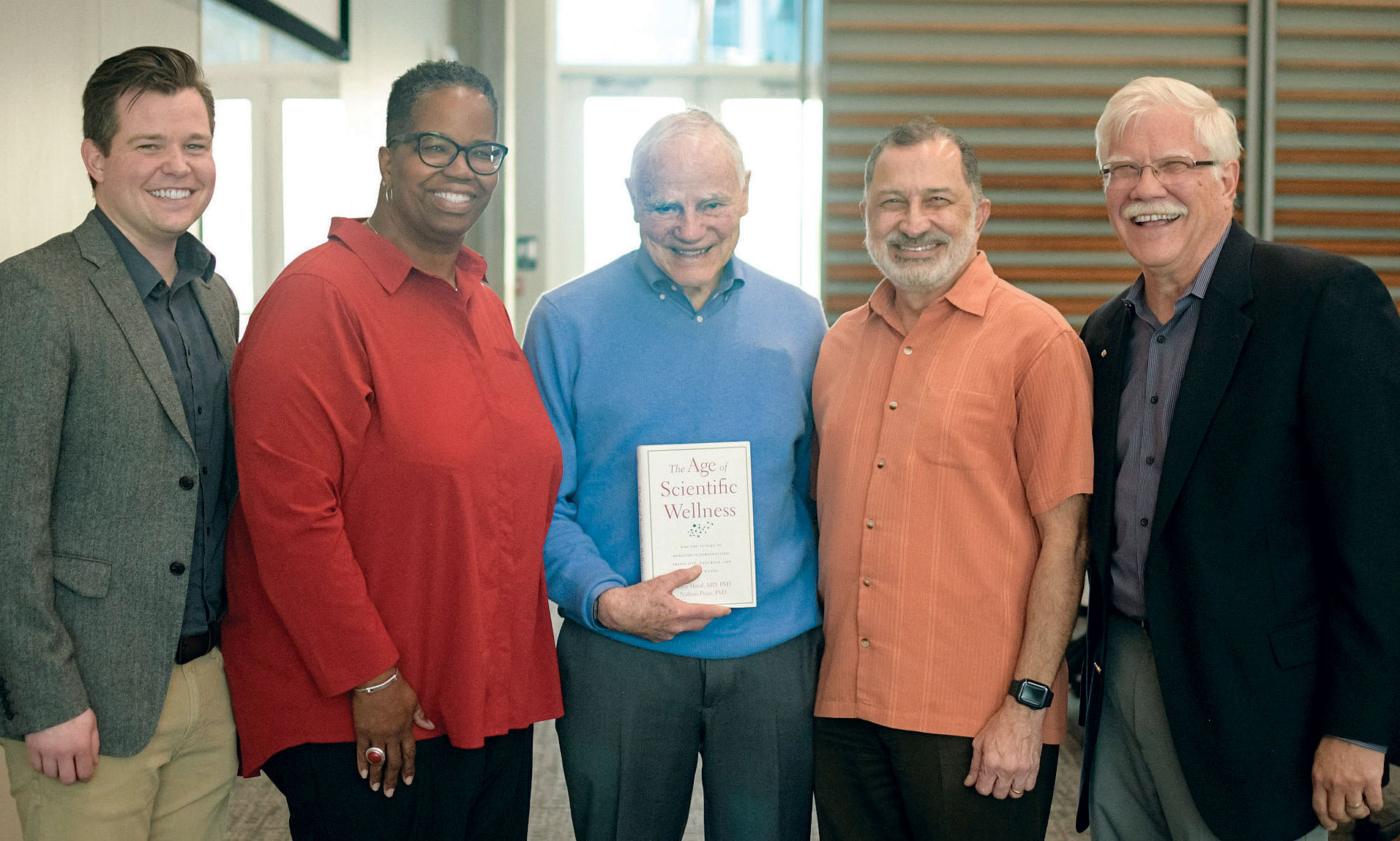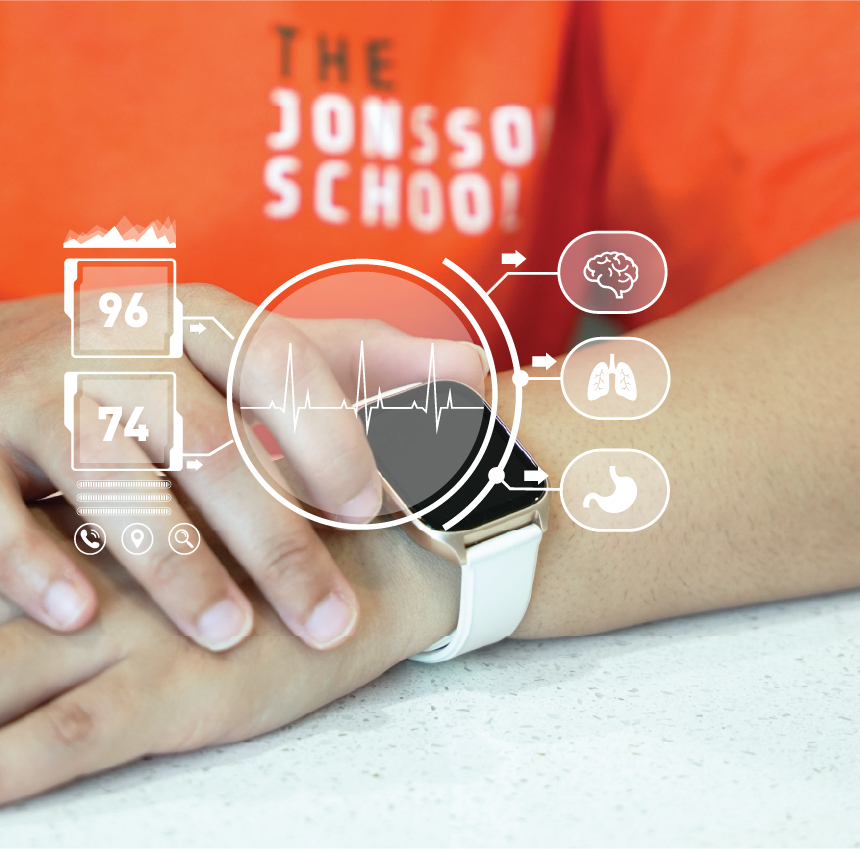Distinguished Lecturer Discusses Expanding Genomics to Phenomics
Fragments of data about our health are collected continuously by our watches and smartphones and then transmitted to our electronic health records. How can these loose data points translate into meaningful, long-term health solutions?
Dr. Leroy (Lee) Hood, the CEO and founder of Phenome Health, a nonprofit dedicated to delivering health innovation and enacting social change, discussed this question and more earlier this year during the Jonsson School Distinguished Lecture titled “The Transition from Genomics to Phenomics in Precision Population Health.” Genomics refers to the study of an organism’s DNA, while phenomics refers to the more comprehensive study of an organism’s traits including its DNA, behavior and environment.

From left, Dr. James Yurkovich, lecturer in systems engineering and chief innovation officer at Phenome Health; Dr. Stephanie G. Adams, Jonsson School dean; Dr. Leroy (Lee) Hood, distinguished lecturer and Phenome Health’s CEO and founder; Dr. Poras Balsara, vice dean of the Jonsson School and professor of electrical and computer engineering; and Dr. Stephen Yurkovich, head of the Department of Systems Engineering; meet following Hood’s lecture. Hood holds a copy of his book The Age of Scientific Wellness, released in April 2023, which details the new phenomics-based approach to wellness.
The lecture series is designed to inspire students, faculty and staff from across The University of Texas at Dallas and spark interdisciplinary conversations.
“Lee is a rock star with expertise that spans the fields of biology, medicine, engineering, data science and more,” said Dr. Stephanie G. Adams, dean of the Erik Jonsson School of Engineering and Computer Science and holder of the Lars Magnus Ericsson Chair in Electrical Engineering. “His lecture awakened our brains. I felt energized and challenged by his presentation. Lee is a testament to what can be accomplished if we are willing to cross disciplinary lines and imagine what is possible. In order to solve the challenges of the 21st century facing the STEM community, we will need more talent like Lee.”
Hood is credited with coining the term systems biology. He is a rare member of the three national academies: the National Academy of Engineering, the National Academy of Sciences and the National Academy of Medicine. Hood is also a serial entrepreneur and helped create several companies including Amgen, now one of the world’s leading independent biotechnology companies.
BIOTECHNOLOGY AND THE HUMAN GENOME PROJECT

Hood advocates for a holistic, data-driven approach to health, where individuals track their own data through commonly available devices and physicians can provide ultra-personalized health recommendations.
Hood played a major role in developing the DNA sequencer used in the Human Genome Project, a publicly funded international effort to study all of the DNA of a single human genome sequence, and in the 1990s, was at the forefront of the project. Hood has continued his work into an expansive future by employing big data approaches for studying the origins of health and advancing more targeted disease prevention and treatment — precision human health.
Hood began his lecture by describing how the field of phenomics has been made possible due to major advancements over the past 20 years.
“There were no good tools for generating enormous amounts of data that could be used in deconvoluting everything,” Hood said.
Today, with big data on the rise, truly individualized approaches to health — focusing on wellness rather than upon disease treatment and management — will soon be possible through phenomics, Hood said.
Phenotypes are more specific than genotypes in that all of an organism’s observable characteristics are influenced by its genotype or specific DNA sequence, its environment and its behavior. Each individual has a unique phenotype. When studying the phenotypes of a million or more people, scientists can provide precise recommendations for disease interventions such as diet, exercise and even medication.
Hood described the changes over the past 50 years as a series of paradigm shifts, beginning with the merger of biology and engineering in the 1970s and then movement to the Human Genome Project, which was launched in 1990 and completed in 2003.
The Human Genome Project cost around $3 billion to produce a single human genome sequence. This major scientific advance has led to breakthroughs in the study of immunology and genetics. However, it was just the beginning of a shift toward more individualized health made possible through electronic health records and systems biology approaches to health.
FROM DISEASE MANAGEMENT TO WELLNESS AND PREVENTION
New tools that can provide more granular insights are enabling health care providers to take a very different approach toward maximizing wellness.
“It will mark the beginning of the end of many chronic diseases,” Hood said. “I’m very optimistic about that possibility.”
Hood described how individual health passes through three distinct phases: wellness, disease and transitions from one to the other. The goal is to detect disease at its earliest stage so that in middle age individuals could extend their health span, not just their life span. That way, people would spend a greater portion of their lives in a wellness phase rather than in a disease phase. By focusing on targeted disease interventions for individuals, medicine would undergo a dramatic shift from the current emphasis on disease treatment and management toward wellness. Additionally, when needed, physicians would have substantially more accurate data about how a specific disease intervention might perform.
For example, some individuals are genetically predisposed to having high cholesterol while others are not. Those individuals with low predispositions can reach healthy cholesterol levels through diet and exercise alone, Hood said. Those with predispositions, however, may be identified through a genetic test and prescribed statins — the only effective therapy.
Brain health is another dimension of health that can be impacted through disease interventions in middle age, Hood said. BrainHQ, a commercially available app developed by researchers at the University of California, San Francisco and used by athletes such as former quarterback Tom Brady, analyze more than 25 different cognitive features via a variety of assessments and activities. Hood emphasized that using this brain training regimen has provided people with the ability to restore lost function, as validated in dozens of clinical trials.
“The majority of 80-year-olds could return to function at the same level as they did in their mid-30s,” Hood continued.
Phenomics in the News
Popular Mechanics
Leroy Hood Wants to Show You How to Live for a Really, Really Long Time
The Wall Street Journal
The AI Will See You Now
Big Think
How “Centaur AI” Will Radically Reshape the Future of Healthcare
Scientific American
A New Scientific Strategy for Keeping People Healthy
“I felt energized and challenged by his presentation. Lee is a testament to what can be accomplished if we are willing to cross disciplinary lines and imagine what is possible.”
— Dr. Stephanie G. Adams
Jonsson School Dean
PHENOMICS AND PERSONALIZED HEALTH
Through phenomics, big data is employed to predict how people with specific phenotypes will respond to disease interventions and how their health recommendations can be custom designed.
“How we find the biological age is enormously complicated,” Hood said. “We look at a series of algorithms. Then, we move on to data analysis, which is the most exciting part. Moving from correlation to causal inference makes a much bigger difference.”
Hood envisions that aging itself will be considered more relative in terms of a person’s biological age versus their chronological age. The major features of behavioral interventions may include exercise, diet, stress management and intermittent fasting recommendations.
Body mass index (BMI), as one example, misclassifies up to 30 percent of people, but it is currently the best tool that is widely available, Hood said. With better, more intuitive systems and health metrics such as data-driven BMI, physicians would gather much more comprehensive information, and individuals could obtain insights about how behavioral changes like starting a new strength training routine or adjusting their sleep schedules will impact their overall health. He describes this concept as “P4 health”: predictive, preventive, personalized and participatory.
“The majority of 80-year-olds could return to function at the same level as
they did in their mid-30s.”
— Dr. Leroy “Lee” Hood
CEO and founder of Phenome Health
Hood identified several major problems facing the United States health care system, which he said lags among high-income countries due to a lack of wellness-focused medicine. Those problems include quality of care, an aging population that will require more resources, value-based care and diversity, equity and inclusion.
Here inclusion refers to including a broad enough sample size to account for variability according to ethnicity and also including groups that may not have had the access or ability to participate in clinical trials in the past. In other words, scientists need data that is representative of the entire human population to help the largest number of people. Where the Human Genome Project was concerned with a single genome, Phenome Health’s Human Phenome Initiative will collect data from more than a million individuals that span the diversity represented in the U.S. population.
Watch the Lecture
UT Dallas Media
Distinguished Lecture: Catalyzing a Paradigm Shift in Healthcare from Disease Care to Wellness and Prevention Care
By Dr. Leroy (Lee) Hood
Researchers will integrate newly collected data and contextualize known mechanisms captured in Google and UC San Francisco knowledge graphs. Through Google’s Biomedical Data Commons, there are a staggering 50 billion nodes, 850 billion edges, 215,000 variables and 566 properties.
Next, through hyperscale artificial intelligence, an educated system similar to ChatGPT will be fed individual data to derive actionable recommendations that will then be delivered to clinicians. Ultimately, each person can have a digital twin to simulate the effectiveness of certain disease interventions — without needing to implement these disease interventions on the individual.
At the event, Adams noted that school leaders from across the University including Dr. Inga Musselman, provost, vice president for academic affairs and the Cecil H. Green Distinguished Chair of Academic Leadership, and chemistry professor, and Dr. Steven Small, dean of the School of Behavioral and Brain Sciences and Aage and Margareta Møller Distinguished Professor in Behavioral and Brain Sciences, were present.
Adams and Dr. James Yurkovich, who currently serves as chief innovation officer at Phenome Health as well as being a member of the Industrial Advisory Council for the University’s Department of Bioengineering and part-time systems engineering lecturer in the Jonsson School, introduced Hood. The scale and scope of an endeavor such as what Hood presented are massive.
“The numbers and statistics Hood shared echo why we must have diversity in science,” said Adams, also a professor of systems engineering. “For our students – keep dreaming, keep pushing, get out of your comfort zone. The work we need to do is transdisciplinary.”
Discover More
BUILDING A BETTER DESIGN COURSE
BUILDING A BETTER BIOENGINEERING DESIGN COURSE: PREPARES STUDENTS FOR CAPSTONE
THE POLYKARP KUSCH LECTURE SERIES
ROBOTICS PAST | present | futureRobots are becoming ubiquitous. Food delivery robots roll casually throughout The University of Texas at Dallas campus. Lawn-mowing robots crisscross the field outside the Administration Building. Drone racing is now a team sport with...
CHARGED UP for Battery Research
Collaboration Leads to New Center, University’s Largest Grant As electric vehicles and renewable energy sources including solar and wind are scaling production, researchers across the globe are racing to develop a critical system component — grid‐scale battery storage. Faculty from the Erik...
Empowered Learner
Q&A with Mercy Chelangat Koech Mercy Chelangat Koech, an electrical engineer from Kenya, has relocated to The University of Texas at Dallas to pursue a PhD in electrical engineering in the Erik Jonsson School of Engineering and Computer...
UTD TECHNOLOGY EXPERTS SEPARATE CHATGPT
FACT FROM FICTION AT COMMUNITY FORUM Science reporter Adithi Ramakrishnan of The Dallas Morning News moderated the forum.University of Texas at Dallas technology experts dispelled misconceptions and highlighted advantages of a new artificial intelligence (AI) tool that has stirred growing chatter...
SERVICE AT SCALE
SERVICE AT SCALE
